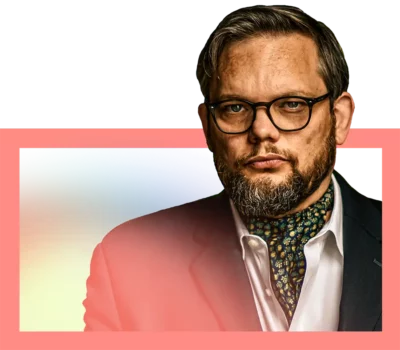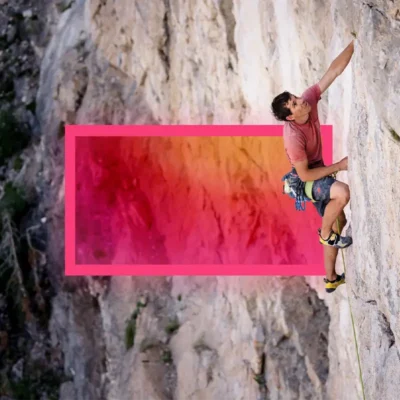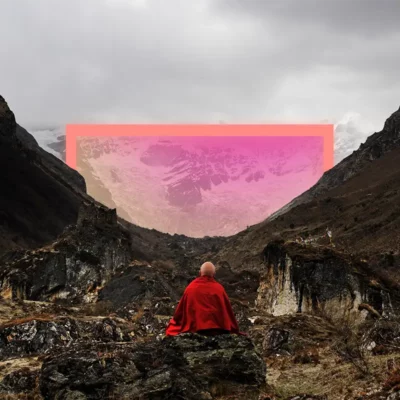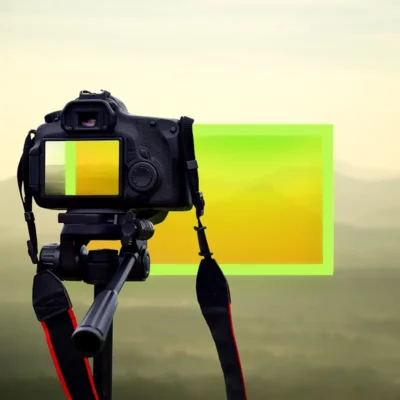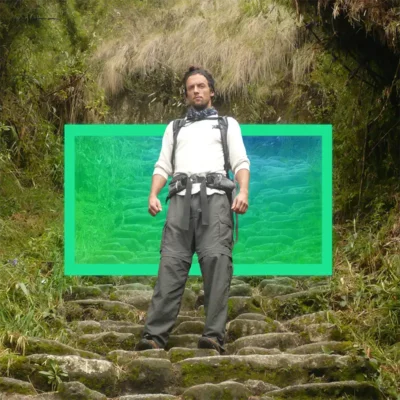Experiencing the world through my senses
When Fred Minnick returns from his military service as a photographer documenting the war in Iraq, he finds himself haunted by what he saw through the lens of his camera. Trauma, as a result of the battlefield and his childhood, holds a grip on him until a bag of barbecue potato chips unlocks something in his brain. An untapped talent — he was born with a remarkable sense of smell — serves as a lifeline back to the present moment, and back to himself.
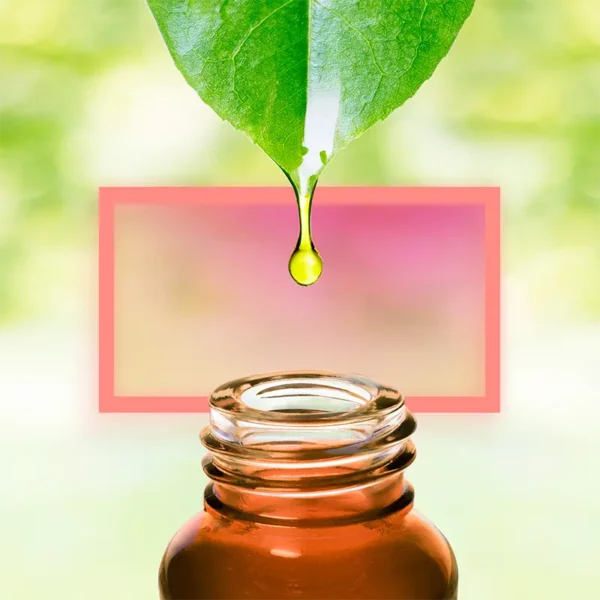
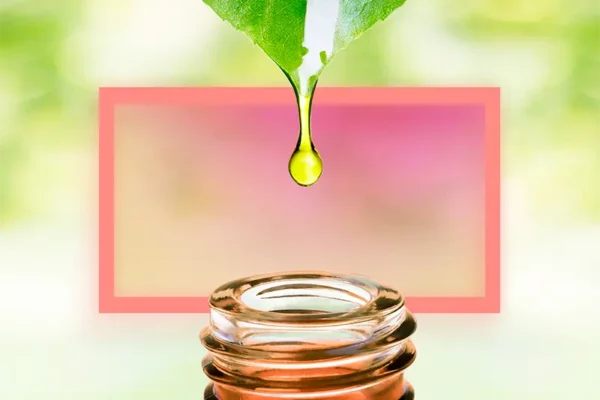
Table of Contents:
Transcript:
Experiencing the world through my senses
FRED MINNICK: I pick up a vial of eucalyptus, unscrew the cap, and put it to my nose. I close my eyes, and breathe in. A sharp minty scent hits me. The smell winds its way to the very back of my nose.
I‘ve smelled eucalyptus hundreds of times, but I’ve never taken the time to really just become entranced with it. Now I allow myself to let the smell linger in my senses with nowhere to be and nothing to prove.
ROHAN GUNATILLAKE: Fred Minnick was born with an unusual talent: a truly remarkable sense of smell. He’s become one of the preeminent “noses” in the world of bourbon, as a spirits author, historian, and curator. In today’s story, Fred shares how his senses have served as a lifeline back to the present moment, and back to himself.
In this series, we combine immersive first-person stories, breathtaking music, and mindfulness prompts so that we may see our lives reflected back to us in other people’s stories. And that can lead to improvements in our own inner lives.
From WaitWhat, this is Meditative Story. I’m Rohan, and I’ll be your guide.
The body relaxed. The body breathing. Your senses open. Your mind open. Meeting the world.
MINNICK: Mom stands at the kitchen sink looking out into our backyard. Her arms are sunk deep, up to her elbows in suds, as she washes the dishes from lunchtime. Her gaze is set on the chain link metal fence corralling our small brick homestead.
We live in Jones, Oklahoma. Population: 2,270. So tiny that all we have is a single stoplight and one major company — they process battery parts. Everything else is farmland. Our tiny farm, well, really isn’t the kind of farm you imagine. On a few acres, we own chickens, pigs, sheep, and an occasional horse. My job: manage them all, but especially the pigs.
“Freddy,” mom calls out for me. “You need to go clean the pen.”
“What are you talking about, mom? You’re in the kitchen; the pigpen is out in the yard.”
“It needs to be cleaned.”
“I cleaned it yesterday,” I tell her. “There’s no way the pigs have messed it that quickly.”
“Well, you need to clean it again,” she assures me.
The thing about mom is, she can smell things from miles away, before anyone else can smell it.
And I know one thing for certain: you do as mom says.
I step out of our small brick house, into our backyard full of lush, green vegetation. In the distance I see the tan barn dad and I built where we keep the feed for the animals.
It’s summertime. The sweet smell of honeysuckle hits me full blast. The aroma is thick, fruity with hints of honey. A touch of vanilla. My nose tingles over the aroma of earth and honeysuckle — two of my favorite smells.
My sense of smell isn’t typical. My sense of smell is a gift from God passed down from my mom’s side of the family. Like mom, I smell nature miles away, before anyone else does. When scents flow through the air and land on my nostrils, they leave a deep impression on me. My brain is a filing cabinet full of different scents from over the years. They mark places and moments in time that have deep meaning for me.
Like granddad’s cornbread. I watch closely as he stirs the mixture in the skillet over the stove. His large meaty hands are burly and dark, a pigment that comes from his Cherokee roots.
And then moments later, the smell rushing out of the cast iron heating up in the oven … it’s unforgettable. I smell the conversion of starch into sugar. Once the corn starts cooking, the starches get pushed into the pan. An array of sweetness mixes in the air with the pungent aroma of iron as the cornbread rises. It’s such a rich smell. There’s nothing quite like it.
I continue through the yard towards the pigs like mom asked.
By the time I reach the pigpen, I already know mom is right. Even though I resist, my nose hints at it before I leave the house. Sure enough, those pigs have let it rip all over their pen.
I clear the pen and make my way back towards the house. The flavorful aroma of granddad’s cornbread and chocolate gravy sings my name from the kitchen. The centerpiece of our yard, a regal, towering pecan tree comes into view. It’s enormous. It feels like it touches the sky. My brother laughs, soaring on the swing that hangs from its branches. As I pass him, I reach down and pick up pecans scattered in the grass. I smile, they’re ammunition for my slingshot later. I love this old tree. It’s like a family member. I get up close to touch the rippled bark. The bitter aroma of the pecans’ hard shells lodges deep in my nose. This is the smell of life for me. Beautiful, rich life.
As a teenager, I experience a great deal of turbulence.
I hang out with a crew that I worry will all end up in jail and pull me down with them. We ride our bikes across the countryside and cause trouble everywhere. We scuffle with poachers who illegally hunt beavers and narrowly escape. The fire department chases my crew down when our hideout burned to the ground and risked a major wildfire.
In my town and with many family members, there is abuse. I see selfishness. I see toxic relationships. I see people take advantage of others. I see broken promises that end up hurting those I love. I can’t save an important family member from drugs, a life they choose that destroys my innocence. I can’t change my relatives who hurt my parents. I’m just a kid, I don’t have the power to change anything. But it doesn’t mean I accept the destructive behavior I see unfolding around me. Something deep inside of me fights back, I never want to be that person who says it’s okay.
GUNATILLAKE: Do you remember a time when you felt helpless? I certainly do. What happens when you refuse to let your circumstances dictate who you are? Let’s meet Fred here.
MINNICK: Smells are the backbone of my best and my worst childhood memories. Like the overwhelming odor of burning plastic. I smell it for the first time on a rescue mission with dad. We have a relative who’s gone missing. Dad hitches up the trailer to his black Dodge pickup truck, and we drive into a neighborhood of Oklahoma City that’s on the news all the time.
We walk into the residence. Dad is sure and steady as he tells my relative we can pack them up and bring them home today. But they don’t care. They don’t need any help. The addiction is talking.
I look them straight in their eyes and a surprising ultimatum slips out of me, I’m fifteen, “This is it. If you don’t come in the truck with us now, I mean, that’s it for you in my life.”
I won’t let my family continue to be dragged down by them.
We exit without my relative. It’s the first time in my life that I recognize the necessity of letting go — how some people leave you no choice.
That smell of people burning their possessions in large barrels just to stay warm … it stays with me. It’s a smell tightly wrapped around a memory that I never lose.
Later, I lay in a blanket on the grass staring up into the bright blue sky. Our house is on the descent flight path of the Tinker Air Force Base. It’s my favorite part about our land. I watch the planes zip through the clouds all day. The AWACs planes — stealthy surveillance crafts that keep our skies safe — fly so close to our home I swear I can reach out and touch them. I close my eyes and dream of the brave servicemen and women inside. They’re heroes.
I’m obsessed with the armed forces. GI Joe is my favorite show. I watch all the military movies I possibly can. I gravitate towards soldiers, the way they’re heralded for heroism and the way they’re honored.
In response to the turmoil in my family I can’t control, I develop the desire to constantly help others, to do things that improve the community. I begin to envision myself being in the service, helping save someone’s life. I’m drawn to a sense of duty that I can’t ignore. I don’t want to know who I am if I don’t have that.
Growing up in Rural America, I also love watching things grow. I plant a seed one day, and three months later I see fruit. I feel a connection to the earth, to the soil that is deeply gratifying.
My pigs win ribbons and trophies at farm shows across the region. There is this one agricultural class at school where the teacher really impresses me. It leads me to write as a local reporter, covering pig shows all across the county. I see my name in the newspaper for the first time, and it shifts everything for me. I’m writing for the Oklahoma County Newspaper. But I’m Hemingway. I’m Steinbeck. It gives me purpose, dreams, and ambition, but I’m straddling the line between two worlds: one of aspiration and one where I’ll probably end up in jail or on drugs. I’ve been looking for an excuse to break away from this path, from these friends, and this is it. I’m going to be someone someday. I can’t let anything hold me back anymore.
After I turn 18 it’s time to go to college. The Oklahoma National Guard steps up to pay for it. In a nine-year military career, I give one year of my life to documenting the war in Iraq as a photojournalist. I’m a soldier in active combat situations. It’s nothing like I ever imagined as a kid thinking I was going to be some war hero. You see these movies about the military, and you build this picture in your brain. You think you know how you’re going to react when you see some of this stuff in real life, but it’s completely different. Everything seems perfect until that first bullet is fired.
I come home haunted by the things I see through the lens of my camera and the rockets, the bullets that nearly claim my life. So much is happening to me that I don’t know how to process it all. No one teaches me how to step back into everyday life when I return home from the battlefield.
On the news, all anyone wants to talk about is Britney Spears and Michael Jackson. It’s either politics or pop culture. That’s all they cover, and it just hurts. I feel like everyone in combat deserves validation and respect for their service.
But instead, within a day or two of being out-processed and back home, I find myself at a party with some young ROTC cadets. The kitchen’s been recently cleaned; bleach burdens my sensitive nose. I’m drinking with my buddy. All these future officers are huddled in the kitchen, yelling about how they’re going to avoid deployments into Iraq.
I notice my palms getting sweaty. I start fuming over their dumb ignorance.
Before I even realize what I’m doing, I’m in the middle of their huddle, trying to fight them all. My battle buddy pulls me back, and it’s the first time I see the rage inside of me. He pulls me outside to calm down. I catch my reflection in the window, and it’s like I’m watching a stranger. It’s like all the light has been sucked from my eyes, and I don’t know who that person staring back at me is anymore. Whoever existed before going to Iraq, that guy is gone. My sense of duty and service is replaced by anger. I’m lost. Ungrounded.
GUNATILLAKE: While Fred is ungrounded, that doesn’t mean that we have to be. A reliable way to ground us is to feel the ground, be that through the contact of your feet or your seat, or if you’re lying down, your back. And let your attention rest here, connected to the earth.
MINNICK: The cold, metallic chair creaks beneath me. The room around me is very industrial. The buzzing sound of the overhead lights may annoy some, but for me, they’re peaceful. The humming quiets the noise in my brain. I sit in a therapy chair at the VA.
The thing about going to war is that when you come home, you need to find your way to deal with the demons. I can’t find my way. I need help.
When I get into that therapy, I have to focus on myself. And when “I” comes up, the rest of my story comes up. It’s not just Iraq.
The first hurdle is getting past the war. The next hurdle is all the other demons I have in my life. All those old wounds I blacked out.
I’m introduced to all kinds of therapy. Cognitive behavioral therapy to rewire my reaction to anger. Exposure therapy to rewrite the trauma to minimize its effect. Each helps me feel more compassion toward myself, toward this anger that lives in me.
But it’s still there. I don’t know how to make it leave.
Today my therapist wants to try something new. I look straight into her eyes as she hands me a bag of barbecue potato chips. I’m astonished. She smiles.
She instructs me to take a chip out of the bag and take a slow bite.
“Think about how it feels on the tongue. Think about how the salt separates from the barbecue. Think about what part of the tongue it’s hitting. Where does it crunch?” she asks me. “Be very, very specific about it.”
I taste the salt on my lips mingling with the crispy sweetness of a rich barbecue sauce. The intense focus begins with taste, but then rolls up to my heightened sense of smell.
My sense of smell is a natural ability. But here, I’m asked to surrender everything else and focus purely on the aromas. I’m not used to smelling so intentionally. My anxiety mutes. I feel awake. It feels like I’m unlocking this new part of my brain.
The following day, I’m on the couch in my living room trying to wake up. The morning sun beams down through our downtown studio. My two cats rub up against my legs.
My wife Jaclyn is practicing acupuncture at a yoga studio. The coffee table is covered in small vials of essential oils that she’s brought home.
I pick up a vial of eucalyptus, unscrew the cap, and put it to my nose. I close my eyes and breathe in. A sharp minty scent hits me. The smell winds its way to the very back of my nose. I‘ve smelled eucalyptus hundreds of times, but I’ve never taken the time to really just become entranced with it. Now I allow myself to let the smell linger in my senses with nowhere to be and nothing to prove.
I’m taken to another plane.
My mind slowly begins to drift away from Iraq, from the news, from so many of the things that bother me. Instead I wonder: “Where does this plant come from?”
Without even knowing where eucalyptus grows, my mind moves me into a sandy terrain that looks like Arizona. There are eucalyptus trees everywhere. I get up close to one of the trees and lay my hand on the bark. It’s smooth and mottled with different shades of brown. The silvery sickle-shaped leaves appear frosted, leathery to the touch. My shoulders relax. The tension in my chest begins to loosen.
Wow. That’s all I can manage to whisper when I open my eyes to find myself still sitting on the couch in boxers and a white t-shirt. Just wow.
I feel rooted and aware. I’m here, and I’m okay.
I know some people access the present moment through breath. Through the rhythmic inhale and exhale of air — in through the nose and out through the mouth. But I’m realizing I can enter into that same kind of presence through smell. It’s how I’ve always experienced the world.
My mind drifts back to one of my favorite children’s books about a Spanish bull named Ferdinand. All the other bulls he lived with were always waiting to get in on the next bullfight, to prove themselves. But not Ferdinand. He just wanted to sit quietly and smell the flowers.
For years, I’ve moved through life just bracing for impact and dealing with whatever comes up. That next bullfight.
This is an invitation to live in the immediacy of the moment, where I am free. I don’t always have to let the worst smells take over. I can find the flowers. I can use this gift to root me in the present rather than let it drag me back to a past I’ve tried for so long to bury.
Smell becomes the starting point of finding my center, and holding me to the safety and the perfection of this moment in the now.
I never thought to follow smells that draw me to myself and away from pain. It’s a whole new way of navigating through life.
I start smelling everything I possibly can. I lose hours in the middle of the spice aisle at Whole Foods, allowing my nose to be entranced by the tiny glass jars of brightly colored powders from across the world.
Each smell takes me on an adventure of where I am and gives me a sense of control, of agency, of hope. I don’t just think about the scent. I’m thinking of what it reminds me of: What ocean does it come from? Which country? Where can I be transported to next?
Turns out, learning to smell heals me. It gives me my life back.
The aroma of tea steeping floods the tiny home. It’s the most amazing smell.
When an Iraqi invites you into their home, one of the first things they do is pour you tea. The more sugar they put in, the more they like you. My mouth waters as the man brings the tea over to me in a tiny glass.
The russet color of the tea contrasts with walls surrounding me, cloaked in vibrant tapestries of gold and yellow. Brightly colored rugs of intense reds and royal blues cover the floor. The space is so small but outfitted so extravagantly.
I let my mind linger in the space for a moment longer before opening my eyes. This is a good memory.
The whole experience of sipping tea and being a guest in someone’s house was the best kind of sensory overload. It’s been years since I left Iraq, but I’ve learned how to use smell as a way of healing, parsing the good memories from the bad ones.
I seek out smells that brighten me now. They unlock memories that anchor me in gratitude and peace. Like the oily scent of cedar. It stops me every time I encounter it. I can close my eyes and see a Christmas tree covered in lights and ornaments. It triggers happiness in me. Warmth. Joy.
There are bright, redemptive smells all over my life.
That trauma is always there but I learned to do things to free myself from it. The trauma has no choice but to loosen its grip on me as I keep connecting with what’s in front of me. I’m not held hostage by my past anymore.
Everybody can experience the world through smell. It’s really just a way of getting to know yourself. You don’t need to have a gift for it. Being able to connect memories through smell and taste, it’s just a map of your life. It’s a map of who you are and all you’ve experienced.
You close your eyes and allow your nose to take the lead. It’s a good navigator. Just focus on what’s all around you.
All the distractions slip out the backdoor. All the thoughts about the past and the future lose their hue. It’s just you and the current moment. A natural, always available experience.
The most important thing is to just pay attention. Pay attention to what’s all around you. Good smells, bad smells. When you don’t smell anything at all, move until you do. It sounds so simple but it’s true. The aromas. The hints of odors you never noticed before. Let them take over and tell you a story you’ve long forgotten.
Everyone has that pecan tree in their life. Everyone has that cornbread. Something as simple as a pan of chocolate gravy simmering on the stovetop can unlock a memory we thought was buried for good. It’s what we do with that memory once we’ve recovered it that matters.
I keep smelling, and smelling, and smelling. And suddenly, I’m 12 years old again. I’m scaling the rippled bark of the old pecan tree. I’m sucking in that sweet, bitter smell. My brother is down on the ground below me. He loads a pecan into his slingshot and lets it rip, sailing through the air towards me. The smell of Jiffy cornbread leaks out of the kitchen as granddad opens the rickety screen door and stands out on the porch. It’s nearly time for dinner. I close my eyes. Warmth spreads across my chest. I’m home.
Rohan’s closing meditation
GUNATILLAKE: Thank you Fred. Each of our senses provides such a rich and powerful way to guide us back to ourselves, back home. In his Meditative Story, poet Stephen Kuusisto, who is blind, perceives music in the soundtrack of our daily life. For another great reflection on navigating using our senses I invite you to check out Stephen’s episode: Allowing sound to reveal life’s wonder. There’s a link to listen in the show notes.
Now, that thing that Fred’s therapist does with the potato chips, the barbeque potato chips, it’s a classic mindfulness exercise for beginners. Often it’s done with a raisin, but hey, chips are actually maybe a better idea because of the saltiness and the crunch.
As Fred picks up right away, it’s all about paying attention to senses that we maybe typically don’t. One of the reasons I like it as an exercise is that by being extra aware of something as simple as eating a chip, we can gain access to a whole different level of sensory experience. It’s a kind of opening. And totally was for Fred.
Inspired by Fred, let’s do a closing meditation all about our senses. It is of course through the senses that we meet the world. So it’s a good idea to do a regular sense check-up so that we meet the world as fully as possible.
Let’s start with hearing, because you know, this is a podcast.
You may have earphones in or you may not, no matter. Turning our attention into what is here to be heard.
Allowing sounds to come to you. No grabbing required.
And being ready for subtlety. What is the most subtle, most soft sound you can hear? What is it like? What are its qualities?
You don’t need to have a gift for hearing. You just need to tune into hearing and tune into the subtlety, and it will reveal itself.
Now your sense of vision. If it feels OK to be with eyes open, even if the lights are off, please allow the eyes to be softly open.
Eyes relaxed, take in the whole field of vision, not looking at anything in particular at the moment. Not making any visual object special, so that everything can be special.
Eyes open, face soft, field generous. Enjoying the colors and the forms and the light and the darkness that is here.
Touch. The most common sense we use in conventional mindfulness practices. Because it’s always here. Always dependable. Body. Breath. Sensations.
But this time, with Fred pointing us towards depth and delicacy, let’s try something different. Allowing the body to be super still, can you tune into your heartbeat? Just give it a go.
It’s there.
A good way I find to tune into it is to place my awareness in the general region of the heart and just invite it to appear. And because it’s there, pumping, the sensations will arise.
Give it a go, and if you are aware of it, then great. And if not, then that’s great too. Just know what is here to be felt.
Now. Smell and taste are, as Fred reminds us, close friends, but let’s turn to smell. What is here? There may not be anything obvious to smell. But that’s OK. Remember, what we’re doing is tuning into this sense and knowing what there is, whatever that is.
And if you like, you can bring the back of your hand up to your nose, picking up the scent from the skin. It’s likely to be subtle, but that’s what we’re doing.
So, as we close up. I’d like to remind you of Fred’s invitation. The most important thing is to just pay attention. Pay attention to what’s all around you. Good smells, bad smells. When you don’t smell anything at all.
And when it’s next convenient, choose something that you know is fragrant and evocative such as a warm plate of food or a scented item or a flower. And tune into it. Letting that smell take you by the hand and guide you somewhere.
You don’t need to have a gift for smelling. You just need to tune into it and be open to the subtlety, and it will reveal itself.
Thank you Fred for such a rich story.
And thank you.
Be well, and smell well.

